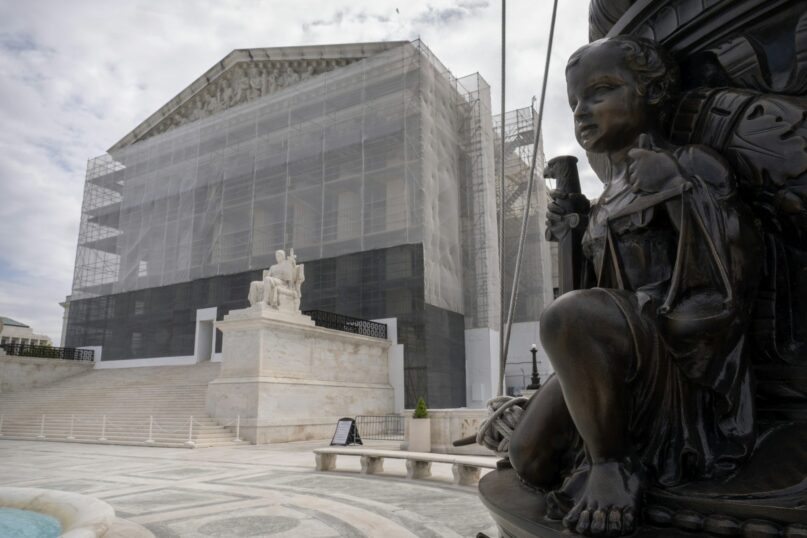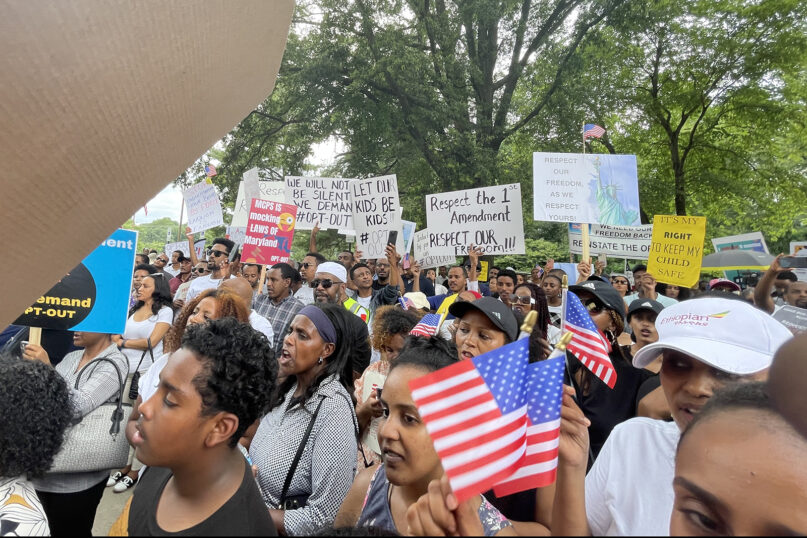(RNS) — On Friday (June 27), the Supreme Court ruled in favor of religious parents from Maryland’s Montgomery County who sought to remove their children from classes that discussed LGBTQ-themed storybooks.
Conservative justices voted 6-3, with liberal justices dissenting, in Mahmoud v. Taylor, brought before the court in April. The lawsuit represented Muslim and Christian families who argued Montgomery County Public Schools infringed on their religious rights by barring them from opting their children out of the lessons.
While not definitive, the decision signals the justices’ inclination to see religious parents succeed in their two-year legal challenge to the school’s policy that has dominated discussions at school boards and divided county residents.
And though the decision concerns advocates of the LGBTQ+ community, the county’s religious parents celebrated what they considered a victory. The case is also one of many related to religious freedom on the court’s docket for this term, signaling a sustained interest and concern for religious liberty and expression.
The school board’s decision interfered with children’s religious development and burdened parents in the exercise of their religion, wrote Justice Samuel Alito in the majority opinion.
The books, Justice Alito wrote, are “unmistakably normative,” and “designed to present certain values and beliefs as things to be celebrated and certain contrary values and beliefs as things to be rejected.”
Eric Baxter, vice president and senior counsel at Beckett Fund for Religious Liberty, the legal group representing the religious parents, called the ruling a “historic victory for parental rights in Maryland and across America.”
“Today, the court restored common sense and made clear that parents — not government — have the final say in how their children are raised,” he said in a statement.

The Supreme Court building is seen on April 30, 2025, in Washington, D.C. (AP Photo/Mark Schiefelbein)
Montgomery County’s Board of Education and MCPS said in a joint statement on Friday (June 27) that the ruling sends a “chilling message to many valued members of our diverse community.”
“Although not surprised, we are disappointed in today’s ruling,” they said in the statement. “This decision complicates our work creating a welcoming, inclusive and equitable school system.”
The school system will continue to offer inclusive books and will soon announce guidelines for the upcoming school year in alignment with the Supreme Court decision, the statement said.
In the fall of 2022, MCPS announced a new inclusive English/language arts curriculum for pre-K to 5th-grade students, which included a few books that discussed gender and sexuality. The books included “Pride Puppy!” about a family celebrating Pride Day, and “My Rainbow” about a mother creating a rainbow-colored wig for her transgender daughter. Both were removed from the curriculum in October amid the legal dispute.
After some parents and school principals opposed the new curriculum, MCPS allowed parents to opt their children out of classes discussing the books. However, in the spring of 2023, the school board removed that option.

People demonstrate outside the Montgomery County Public Schools Board of Education, July 23, 2023, in Rockville, Md. (RNS photo/Reina Coulibaly)
Following that decision, a group of three Muslim and Christian families sued MCPS, arguing that not being allowed to opt out represented religious freedom infringement. In August 2023, a U.S. district court dismissed the request by parents, siding with the school district.
“The plaintiffs have not shown that MCPS’s use of the storybooks crosses the line from permissible influence to potentially impermissible indoctrination,” wrote the judge in the district court opinion.
RELATED: Federal judge denies religious parents’ request to opt kids out of LGBTQ+ lessons
The Supreme Court decision reverses lower court rulings.
Holly Hollman, general counsel at the Baptist Joint Committee for Religious Liberty, a faith-based organization advocating for religious freedom, said the decision signals that the court’s majority seems to be concerned about the loss of some religious perspectives in culture. As many previous cases have indicated that exposing students to certain ideas, characters or themes through school curricula wasn’t sufficient to state a constitutional claim, this decision is notable in its “unwillingness to view this curriculum as simply exposure to ideas,” she said.
“For the majority’s perspective, this material or this curriculum, and perhaps the teacher’s guide more importantly that went with it, seem to be telling students what to think about issues of gender identity and sexual orientation in ways that the parent asserted interfered with their ability to provide the religious formation for their children at that age,” Hollman said.
In the majority opinion, Alito noted the curriculum posed “objective danger” to students and exerted a “psychological ‘pressure to conform’ to their specific viewpoints” upon children.
The decision raises questions about public schools’ ability to enforce opt-out policies for classes that address contentious topics in the future, said Hollman.
In the opinion, the conservative justices don’t restrict the type of opt-out requests that can be made, though the decision implies it can be invoked only in cases that pose a “very real threat of undermining” children’s religious beliefs.
“It does make it more difficult for school boards because they will have to consider opt outs, perhaps in more cases than they had in the past,” Hollman said.
For Wael Elkoshairi, a Muslim father whose daughter was a third-grader in MCPS when the dispute started, the case’s elevation to the Supreme Court reflects a lack of constructive dialogue between parents and MCPS.
RELATED: In blue Maryland, some religious parents find hope in Trump’s position on education
“We’re very happy. At the same time, we’re kind of scratching our heads as to why it took this to get to some type of dialogue between us and MCPS,” he said.
Elkoshairi, who believes “marriage is between a man and a woman,” said the books were inappropriate and contradicted his religious beliefs. As a result, he became involved with the group of parents protesting the inability to opt out. He argued religious parents like himself have been harshly criticized for their dissent.
“We were called book burners,” he said. “… We never looked to change any of the books or the curriculum at MCPS. We were looking for the accommodation that was afforded to us initially.”
The problem goes beyond the storybooks, said Elkoshairi, who thinks the curriculum is the latest example of schools overstepping on topics related to gender and sexuality.
“It’s a very slippery slope the parents are on right now,” he said. “We could not agree with MCPS where inclusion stops and indoctrination starts.”
For David S. Fishback, who is a member of Temple Emanuel of Kensington, a Reform Jewish temple that co-sponsored the April 22 rally outside the Supreme Court, and is a former MCPS parent who supported the curriculum, the court’s ruling is a “setback — but not a major setback.”
“While this, for now, deprives MCPS of one particular tool advancing the interests of creating an atmosphere of respect for all people … (the district) will continue to do so, in that respect,” he said. “I’m disappointed in the decision, but I’m very, very pleased that our elected leadership is standing firm.”
Mark Eckstein, a Montgomery County resident who sat on the advisory committee that introduced the curriculum, said that though it seems to have backfired, the storybooks only intended to expose children to the diversity of sexual orientations and gender identities.
“It’s not like we have an agenda — it’s already there,” he said, adding the Supreme Court’s decision reflects an over-politicization of the dispute. “These kids know about it from YouTube. They know about it because their teachers are gay. They know about it because our county council president is gay.”
Brian K. Bond, CEO of PFLAG, an organization advocating for the LGBTQ+ community and allies, in a statement Friday (June 27) called the decision “heartbreaking” for “LGBTQ+ students, families and employees of Montgomery County Public Schools.” The storybooks benefited the students both academically and socially, he argued.
“Learning about different people, histories and experiences in school benefits students,” he said in the statement. “It strengthens empathy and a sense of belonging, increases test scores and graduation rates, and betters mental and physical health, brain development and connections to school and community.”
Following MCPS’ decision to remove parents’ rights to opt out, Elkoshairi enrolled his daughter in a homeschool cooperative coordinated by Muslim families living in the county.
“It cost us money, and it’s cost us time and energy, over and above what we normally were doing with public schools, but we felt like we had no option,” he said. “We were kind of pushed into the corner.”


